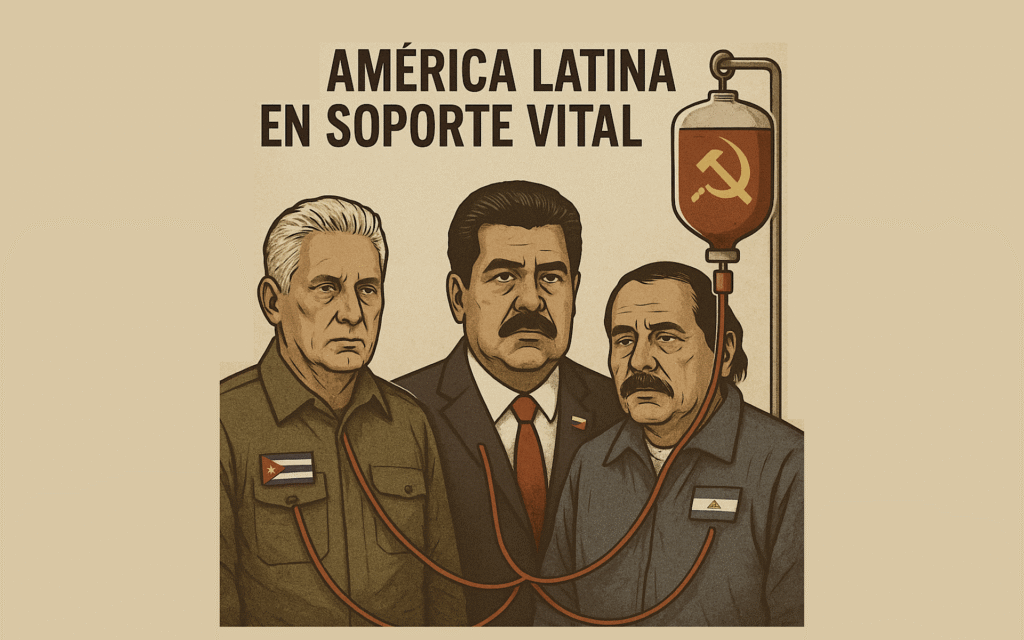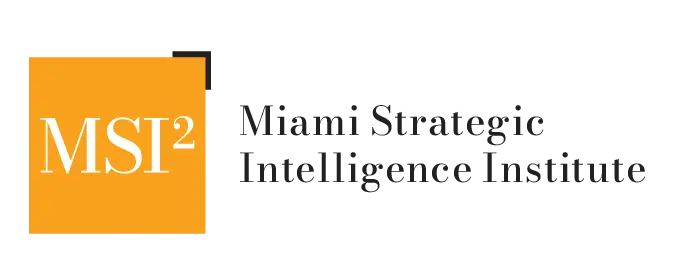18 May Is Socialism in Latin America on Life Support?
By,
Jesús Daniel Romero, Co-Founder, Senior Fellow, MSI²
Executive Summary
The Latin American socialist experiment is unraveling under the weight of economic failure, criminal capture, and failed external alliances. What remains is a network of regimes that sustain themselves not on ideological purity or productivity, but on cocaine trafficking, arms smuggling, and foreign appeasement. Cuba, Venezuela, and Nicaragua are regimes on life support—held up by symbolic partnerships, weak democracies, and narco-financing.
Cuba: Socialism on Life Support, Sustained by Illusion
No Latin American country exemplifies the terminal phase of 21st-century socialism more starkly than Cuba. The economy is wrecked, its infrastructure failing, and its people enduring daily blackouts, food shortages, and repression. Yet the regime survives—not through reform or productivity, but through repression, propaganda, and the political lifelines granted by foreign actors.
President Miguel Díaz-Canel travels the world in opulence—attending summits, dining with dictators, and flying comfortably. Yet everywhere he goes, he holds out a tin cup, seeking aid, oil, credit relief, or debt cancellation. It’s a regime wrapped in Marxist rhetoric, surviving on the charity of authoritarian sympathizers and geopolitical appeasers.
But the most dangerous enabler of all is not China or Russia—it is the European Union. The EU continues to fund development programs, human rights dialogues, and ‘cooperation agreements’ that do nothing to restrain the dictatorship’s abuses. European trade and investment flow into the Cuban tourism and biotech sectors, which are controlled by the military and intelligence services. Under the guise of diplomacy, Brussels has chosen accommodation over accountability, becoming the largest Western contributor to the regime’s survival.
Meanwhile, China offers surveillance tools and debt diplomacy, not recovery. Russia offers symbolism, not infrastructure. BRICS and CELAC offer nothing but empty podiums. Mexico quietly ships oil, plugging the gaps left by Venezuela’s collapse.
Cuba remains one hurricane away from catastrophe and one ship away from a blackout. Its socialism is performative, and its survival is external.
Haiti and Ecuador: Case Studies in Narco-State Collapse
Haiti is a failed state repurposed by Colombian and Venezuelan cartels for cocaine transshipment to the U.S. The state’s collapse has created ideal conditions for criminal networks. Ecuador nearly followed suit as the Eastern Pacific became a preferred route to Europe, drawing criminal groups into violent competition that almost overwhelmed national stability.
Venezuela’s descent into economic catastrophe is no longer a slow collapse but a geopolitical free fall. While the Maduro regime continues to project regional influence through cocaine-fueled proxies and intelligence networks, its economic foundations have crumbled beyond repair.
Maduro’s outreach to China and Russia has failed to deliver the investment he promised. Both countries offer rhetorical support, but neither is willing to pour capital into a country crippled by corruption, sanctioned financial systems, and dysfunctional oil infrastructure.
Despite efforts to restart oil output and stabilize the bolívar, Venezuela’s economy remains paralyzed. Inflation continues, state salaries are worthless, and food and medicine scarcity persist.
U.S. sanctions under the current administration have had a more immediate and paralyzing effect than those enacted during President Trump’s first term—disrupting oil sales, gold trafficking, and third-party intermediaries.
With a tightening global posture toward China, the likelihood of Venezuela receiving substantial economic lifelines has dwindled even further. Any emerging U.S.-China trade recalibration threatens to cut off Venezuela’s last remaining illicit financial pathways.
Venezuela today is a narco-state with no sustainable economy—functioning not as a nation, but as a geopolitical irritant backed by transnational crime, ideological theater, and cocaine logistics.

Venezuela’s Drastic Fall: Cocaine Power Without Economic Pulse
Venezuela’s descent into economic catastrophe is no longer a slow collapse—it is a geopolitical free fall. While the Maduro regime continues to project regional influence through cocaine-fueled proxies and intelligence networks, its economic foundations have crumbled beyond repair.
Maduro’s outreach to China and Russia has failed to deliver the investment he promised. Both countries offer rhetorical support, but neither is willing to pour capital into a country crippled by corruption, sanctioned financial systems, and dysfunctional oil infrastructure.
Despite efforts to restart oil output and stabilize the bolívar, Venezuela’s economy remains paralyzed. Inflation continues, state salaries are worthless, and food and medicine scarcity persists.
U.S. sanctions under the current administration have had a more immediate and paralyzing effect than those enacted during President Trump’s first term—disrupting oil sales, gold trafficking, and third-party intermediaries.
With a tightening global posture toward China, the likelihood of Venezuela receiving substantial economic lifelines has dwindled even further. Any emerging U.S.-China trade recalibration threatens to cut off Venezuela’s last remaining illicit financial pathways.
Venezuela today is a narco-state with no sustainable economy, functioning not as a nation, but as a geopolitical irritant backed by transnational crime, ideological theater, and cocaine logistics.
Petro’s Delusions: Cocaine, Communism, and Contradictions
Under Gustavo Petro, Colombia has set new records in coca cultivation. His administration’s contradictions—ending eradication while claiming peace—have empowered narco-traffickers. His embrace of Maduro and alienation of democratic allies have left Colombia more unstable and diplomatically isolated.
Interlude: Cocaine Is the Fuel of 21st Century Socialism
Cocaine has replaced ideology as the engine of Latin American socialism. The Cartel de los Soles finances Venezuela’s regime. Cuba provides intelligence and logistical support. Colombia, under Petro, continues to lead the world in production. The result is not socialism—it is criminalized authoritarianism wrapped in revolutionary language.
Strategic Enablers: Mexico’s Fragility and Brazil’s Facade
Mexico, under President Claudia Sheinbaum, has become a passive conduit for cocaine flowing into the U.S. while shielding Cuba with oil shipments. Meanwhile, Brazil’s war on drugs is largely performative—border regions remain porous and criminal flows uninterrupted. These two countries, through action and inaction, prop up the region’s narco-regimes.
BRICS and CELAC were once hailed as counterweights to U.S. influence in Latin America, but they have proven to be largely symbolic. BRICS has failed to deliver meaningful financial relief, infrastructure development, or security cooperation to its socialist-aligned members. Despite lofty declarations, countries like Cuba and Venezuela have seen little more than rhetorical support. CELAC, meanwhile, has produced no enforceable resolutions or coordinated policies—only summit speeches and ideological posturing. Neither alliance has addressed the region’s real threats: transnational crime, narco-states, and mass migration.
Brazil’s President Luiz Inácio Lula da Silva, once hailed as a pragmatic leftist with global ambitions, has failed to convert his political capital into economic results or meaningful regional leadership.
Domestic Paralysis and Investor Flight
Since returning to office in 2023, Lula’s government has:
– Stalled economic reforms that could boost competitiveness and productivity.
– Alienated private investors through increased taxation, overregulation, and ambiguous fiscal policy.
– Overseen a rising public deficit, with inflation pressures squeezing Brazil’s middle class.
Despite massive state subsidies and rhetorical focus on social programs, real foreign direct investment (FDI) has declined, and public infrastructure projects remain stalled or abandoned.
A BRICS Leader Without Leverage
On the international stage, Lula has pushed to elevate Brazil’s status as a voice of the Global South—but his performance in BRICS has been hollow:
– Lula’s call for a BRICS currency has gained no traction and was quietly sidelined by India and China.
– His attempts to mediate in global conflicts (such as Ukraine) have been seen as naive and diplomatically irrelevant.
– Within BRICS, Brazil remains a junior partner to China and Russia—lacking the financial or military power to shape outcomes.
Despite his rhetoric about independence from U.S. influence, Lula has failed to offer Latin America any coherent economic alternative. Brazil under his leadership is neither a model of development nor a strategic engine for the region.
Lula’s Illusions: Domestic Paralysis and BRICS Disappointment
BRICS and CELAC: Paper Alliances with No Substance
Policy Recommendations: A U.S. Strategy for Democratic Recovery
1. Target the Cartel-State Nexus: Expand sanctions under the Global Magnitsky Act and Kingpin Designations to state-protected criminal structures.
2. Launch a Hemispheric Counter-Narco Task Force: Coordinate U.S. intelligence, diplomacy, and law enforcement to dismantle transnational threats.
3. Disrupt Regime Lifelines: Pressure Mexico to cease oil shipments to Cuba and tighten maritime firearm interdictions.
4. Reinforce Fragile Democracies: Surge institutional support to Ecuador, Panama, and the Dominican Republic before collapse.
5. Lead a Regional Isolation Campaign: Use OAS mechanisms and diplomatic coalitions to delegitimize Maduro, Díaz-Canel, and Ortega.
Final Word
The United States must take decisive action to restore democracy from the grip of thugs, criminals, and sicarios. This is no longer just a regional issue—it is a test of hemispheric resolve and a matter of national security. Inaction is surrender. Strategy, pressure, and principled leadership are the only way forward.
References
AP News. (2022, September 30). Hurricane Ian knocks out power in Cuba: “It was apocalyptic.” AP News. https://apnews.com/article/15fc4a422c798800c0f07a2c48dd5fff
Financial Times. (2024, July 15). Hurricane Oscar leaves Cuban communities flooded. Financial Times. https://www.ft.com/content/5c18e729-f150-4e01-9395-4f831799367c
Reuters. (2025, May 8). Russia promises to invest $1 billion in ally Cuba by 2030. Reuters. https://www.reuters.com/world/russia-promises-invest-1-billion-ally-cuba-by-2030-2025-05-08/
World Energy News. (2025). Pemex increases crude exports to Cuba by 20% in 2024. World Energy News. https://www.worldenergynews.com/news/mexico-pemex-increased-crude-exports-cuba-2024-760883
United Nations Office on Drugs and Crime. (2024). World Drug Report 2024. https://www.unodc.org/unodc/en/data-and-analysis/wdr2024.html
U.S. Department of Justice, Drug Enforcement Administration. (2024). 2023 National Drug Threat Assessment. https://www.dea.gov/sites/default/files/2024-03/DIR-003-24_2023-NDTA.pdf
InsightCrime. (2024). Cocaine’s Eastern Pacific route: Ecuador’s gateway to Europe. InsightCrime. https://insightcrime.org/news/2024-eastern-pacific-cocaine-route U.S. Treasury—Office of Foreign Assets Control. (2024). Treasury targets “Cartel de los Soles” network under Kingpin Act. U.S. Department of the Treasury. https://home.treasury.gov/news/press-releases/jy1234
The opinions expressed in this article are those of the author and do not necessarily reflect the views of the Miami Strategic Intelligence Institute (MSI²).
